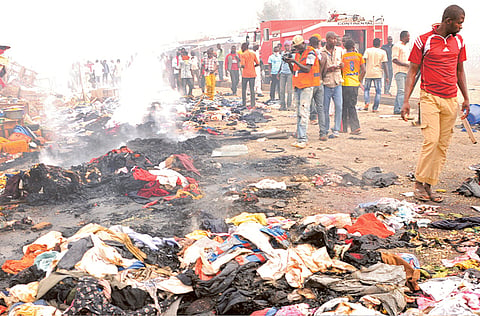Nigeria bombings leave over a hundred dead
No immediate claim of responsibility for twin blasts in Jos

Lagos: At least 118 people were killed in the central Nigerian city of Jos on Tuesday after two bombs ripped through a business district packed with commuters and traders.
There was no immediate claim of responsibility for the explosions, but the bombs bore the hallmarks of other attacks by Islamist sect Boko Haram, which has recently stepped up a bloody five-year battle campaign to establish a caliphate in northern Nigeria, and kidnapped more than 300 schoolgirls from a remote north-eastern school in April. In the past month, the group has set off two bomb blasts in the capital, Abuja, and another in the country’s second city, Kano.
Abdul Salam Mohammad, of Nigeria’s national emergency management agency, said ambulances and volunteers were ferrying wounded and dead from Terminus, an area home to a teaching hospital, shops, offices and a market. He said the death toll was likely to climb as victims were still being pulled from smouldering rubble at the scene.
“It happened very close to the market so most of the victims were people plying their trade. Some had children with them,” he said by phone from the scene, above the wail of sirens.
“The casualty figure is likely to rise because the fire service wasn’t able to clear all the rubble today. They will continue to remove the debris tomorrow and we are expecting to recover more bodies then,” he added.
That could push the death toll close to Boko Haram’s single biggest atrocity yet, a multiple-bomb attack in Kano that killed 170 in January 2012. The attack suggests that the group, which started with hit-and-run home-made explosives thrown from motorbikes, is seeking to make a show of its capabilities before the elections scheduled in 2015.
Witnesses said soldiers had erected checkpoints around the area, and firefighters were still battling to put out flames that continued to rage almost two hours after the blasts.
Far from Boko Haram’s northern strongholds, Jos has been relatively free of attacks by the sect. The group hasn’t struck there since it attempted to ignite sectarian tensions with a series of church bombs on Christmas Day 2011. Jos is at the heart of the Nigeria’s volatile Middle Belt, where clashes over power and resources have often been cloaked in the guise of religious violence.
Religious leaders appealed for calm in the city, which is home to both Muslims and Christians. “A lot of youths risked their lives to go in and rescue people, some of them were people burning in their own homes. No one was asking if they were Muslim or Christians,” said Kola, an eyewitness, who gave only his first name.
But there were glimmers of how frustration and anger at rising insecurity could take on a sectarian character. A group of Christian youths in one neighbourhood set up checkpoints, where they carried out stop-and-searches on vehicles. In another neighbourhood, Christian youths armed with clubs marched towards a Muslim neighbourhood before they were stopped by policemen. “They were very angry, and innocent people would have been their victims,” said Ahmad Sittu, who escaped the crowd by ducking behind a wall.
At least one of the bombs appeared to have come from a car packed with explosives, which witnesses say tore a hole in the ground and caused surrounding vehicles to catch fire. Traders continued to crowd around the scene after the blast, trying to recover charred belongings. Bala Mohammad, a resident who was returning home from his office nearby, said the force of the first explosion threw him to the ground. “People started running to help the wounded, and 10 minutes later the second one went off. It took off the roof of the market building. Many were trapped inside, it was a terrible scene.”
Stung by recent criticism over sluggish responses to attacks, the government was quick to condemn the bombings. “President [Goodluck] Jonathan assures all Nigerians that government remains fully committed to winning the war against terror, and this administration will not be cowed by the atrocities of enemies of human progress and civilisation,” a statement released from his office said.
More than 1,500 people died in attacks by Boko Haram in the first three months of this year after the group stepped up its campaign. At least 105 were then killed in twin bomb blasts in Abuja last month, while a suicide car bomber killed five people in Kano on Sunday evening.
Britain, the US and France have pledged to help rescue the schoolgirls snatched from north-eastern Borno state, marking a potential military escalation in a region already under a state of emergency.


